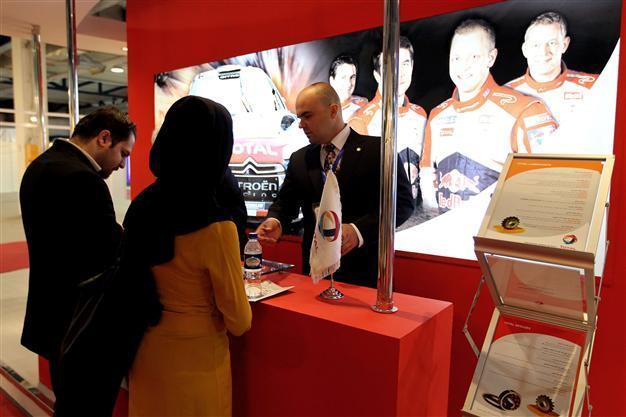Iran withdraws cheap dollars for most imports, price rises feared
DUBAI - Reuters

Participants attend the 18th International Oil, Gas, Refining and Petrochemical Exhibition in Tehran on April 20, 2013. AFP PHOTO
Iran has stopped providing subsidised dollars for the import of most basic goods, Iranian media reported, a move that could push soaring consumer prices even higher in the run-up to a presidential election in June.The Iranian rial has lost two-thirds of its dollar value since late 2011 as a result of Western sanctions targeting the banking system and oil exports over Iran's disputed nuclear activities, putting many Iranians under financial pressure.
Now trading at around 35,000 rials to the dollar, the currency's slump has fuelled inflation by increasing the price of imported goods.
Since last year, the government had sought to cushion the impact on Iranians by providing subsidised dollars at a rate of 12,260 rials to the dollar for the import of grains, medicines, red meat, chicken, sugar and other essential items.
But the official rate will now only be available for wheat, barley, corn and soybean imports, according to a memo issued this month by the central bank, local media reported this week.
The government's action is intended to unify a complex system of multiple exchange rates, local media said, and probably also to preserve Iran's hard currency reserves.
Most imports will now be purchased using currency bought at a government-run "exchange centre", where dollars have sold for around 24,500 rials recently. This will raise import costs.
Critics of President Mahmoud Ahmadinejad have lashed out over the decision. Ahmad Tavakoli, a vocal Tehran lawmaker, said in parliament on Wednesday that meat prices had risen by 60 percent and cooking oil by 35 percent.
"People can't eat meat, they can't eat beans, should they also not eat broth which requires a spoon of oil?" Tavakoli asked, according to the Mehr news agency.
The price of a kilogram of sugar rose to 22,000 rials on Wednesday from 17,000 the day before, a source in Tehran's Grand Bazaar said in an email. A 5 kg can of cooking fat was selling for 235,000 rials, up from 177,000 last week.
Some Iranians have turned to cheaper domestic goods, and one shopkeeper said he now sold mostly Iranian-made cooking oil.
Iranians have also begun stockpiling staples such as red meat, potatoes, onions and cooking oil, fearing that higher prices lie ahead, the Ghanoon newspaper reported on Tuesday.
Higher prices have weighed heavily on the public over the last year. The inflation rate reached 31.5 percent in the 12 months to March 20, the end of Iran's calendar year, according to the government statistics centre.
A 25 percent hike in the minimum wage has been criticised by lawmakers and economists for not keeping pace with inflation.
A presidential election scheduled for June will be the first such poll since 2009, when a disputed win by the incumbent Ahmadinejad prompted mass protests and the worst internal unrest since the 1979 Islamic Revolution.
Critics of Ahmadinejad in Iran's parliament have said his economic policies have exacerbated the impact of the sanctions, which have slashed Iran's oil exports. Ahmadinejad cannot by law run again after two consecutive terms, but analysts expect him to field a candidate close to him to maintain his influence.
















